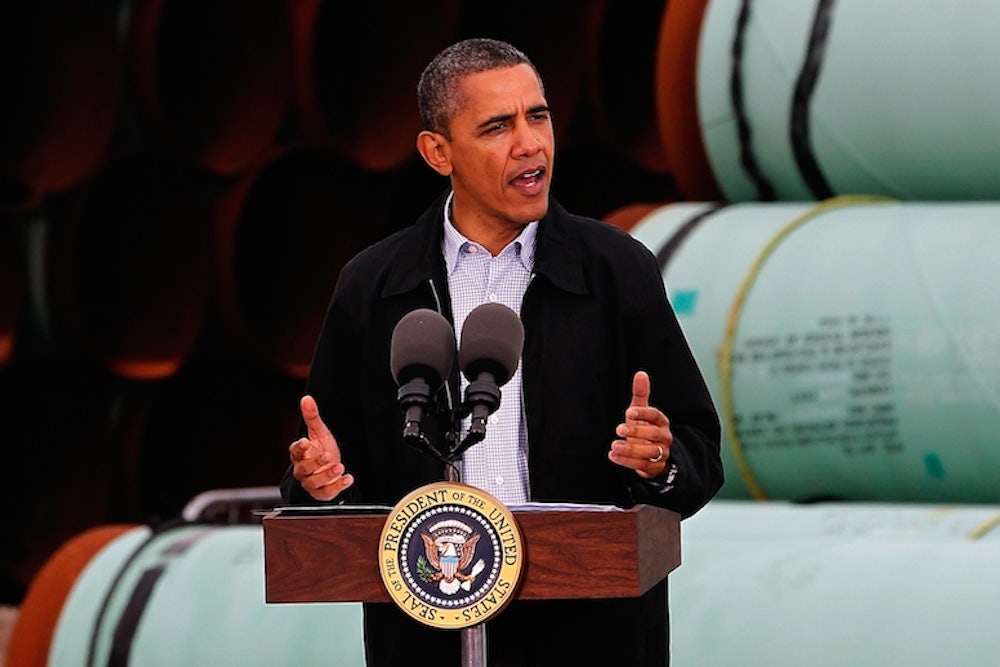President Obama and the State Department on Friday officially rejected TransCanada’s application to build the Keystone XL pipeline. “The State Department has decided that the Keystone XL pipeline would not serve the national interests of the United States,” Obama said in brief remarks at the White House. “I agree with that decision.”
Obama laid out his reasoning, revealing how closely his thinking aligns with the arguments that climate activists have made for years.
But he did shoot down a central argument made by some activists—that the pipeline would ensure a planetary crisis. He criticized Keystone for playing an “overinflated role” as a “campaign cudgel” in Washington politics, refusing to side with both pro-Keystone supporters who said the pipeline was a silver bullet for economic growth and opponents who said it would cause substantial harm to the climate.
His decision to deny TransCanada’s permit breaks down into four main reasons:
1. It wouldn’t create many jobs.
Obama said that “the pipeline would not have made a serious impact” on jobs and the economy. Pipeline supporters have long thrown out wildly inflated estimates of how many jobs Keystone would create, estimates that sometimes climbed to the hundreds of thousands. By TransCanada’s admission, the pipeline would have created several thousand temporary jobs (many of which have come and gone for the southern portion of the pipeline already built), and a few dozen permanent jobs.
2. It wouldn’t have a measurable impact on gas prices.
Obama’s gotten lucky with oil prices unexpectedly coming down to around $50 a barrel. Gas prices are really low, down $1.27 a gallon nationally over the past three years, he said Friday. More efficient mileage requirements for cars have also helped everyday Americans, alleviating pressure on the White House to facilitate more supply. It means Obama could say “we’ve gone ahead and created jobs and lowered gas prices,” while skipping a discussion over how the pipeline would affect gas prices. There was some debate over what Keystone would do to prices: Critics said they could go up for the Midwest, as it ships some of the glut of oil there to other countries; industry supporters argued they would go down because of the increased supply. In all likelihood, they wouldn’t have done much to gas prices at all, because those are determined on the global market, and that’s the argument Obama went with on Friday.
3. It wouldn’t boost America’s energy security.
Keystone supporters had argued that it would be better for the U.S. to get its crude from Canada rather than the Middle East. But Obama explained that this pipeline “would carry Canadian crude oil to our heartlands to ports in the Gulf of Mexico and out into world market.” Furthermore, Obama had promised to cut oil imports by half by 2020, and he bragged that the U.S. has already met that goal. Maybe he shouldn’t take full credit for this, as the boost in private oil and gas development has reduced America’s reliance on foreign imports, in addition to federal policies that encourage energy efficiency and clean energy. But like low gas prices, America’s progress toward energy independence has given Obama the political opening to deny Keystone without too much backlash.
4. It would have undercut America’s efforts to lead on climate change.
Here is the most controversial reason Obama rejected Keystone. While the president did not agree with activist claims that Keystone meant game-over for the planet, he agreed that approving the project would look bad, especially as he’s made the environment a cornerstone of his presidential legacy. Obama argued that approving this project would have undercut his global leadership on limiting global warming. To keep the planet inhabitable, “we’re going to have to keep some fossil fuels in the ground rather than burn them,” he said.
At Paris in three weeks time, Obama will take the stage to tout the series of firsts his administration has accomplished on climate change. Now, he can add Keystone to his list of bragging points.
